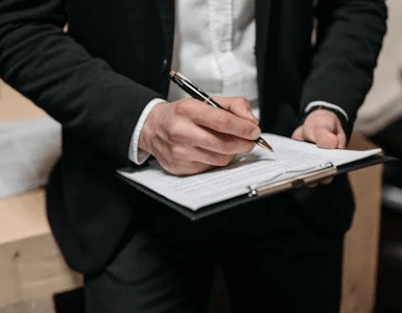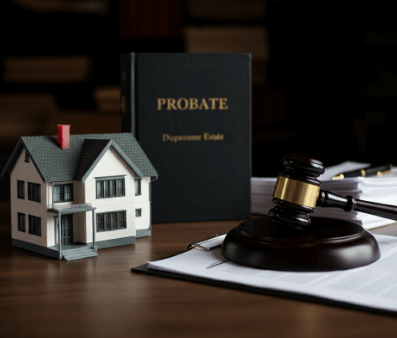Dealing with the probate process for a house in Estero can be overwhelming, especially when compounded by the emotional strain of losing a loved one. For property sellers and real estate investors, understanding the probate process for a house in Estero, Florida, is crucial to ensure you navigate it effectively and avoid potential pitfalls. This post offers valuable tips and insights to help you manage this complex procedure smoothly.
Steve Daria and Joleigh, experienced real estate investors in Estero, understand the nuances of the probate process and advocate for savvy navigation to protect your investment. Their insights highlight the importance of thorough property assessments and clear communication with estate representatives. By leveraging their expertise, you can safeguard your interests throughout the estate settlement.
What is Probate?

Probate is the legal method that occurs after someone dies.
It involves the distribution of their estate as specified to their will or, if no will exists, according to state law.
In Estero, as in other parts of Florida, probate ensures that the deceased’s debts are settled and their assets are given to the rightful heirs.
The court oversees the verification of the deceased person’s will, the appraisal of their property, the payment of debts and taxes, and the dissemination of the remaining properties.
Why is Probate Necessary?
Probate serves several essential functions:
- Debt and Tax Settlement: It ensures that the deceased’s debts and taxes are paid before assets are distributed to heirs. This helps creditors receive their due and prevents legal challenges related to unpaid debts.
- Distribution According to Wishes: Probate makes sure that the deceased’s properties are distributed based on their wishes as outlined in their will. Without probate, disputes among heirs can arise, leading to prolonged legal battles.
- Legal Framework for Transfer: Probate provides a clear legal framework for transferring ownership of the deceased’s property to the beneficiaries, ensuring a structured and lawful distribution.
Initial Steps in the Probate Process For a House in Estero
The probate procedure begins with filing a petition at the local probate court.
For a house in Estero, this would be the Lee County Probate Court.
Here’s a step-by-step guide to get you started:
Filing a Petition
- Prepare Required Documents: The petition typically includes the deceased’s death certificate, a copy of the will (if available), and a list of the deceased’s assets and liabilities.
- Submit the Petition: File the petition with the probate court in Lee County. This starts the formal probate process.
Appointment of Executor
The court shall designate an executor or personal representative to oversee the estate.
This person is responsible for gathering the deceased’s assets, paying debts and taxes, and giving the remaining assets to the heirs.
Get An Offer Today, Sell In A Matter Of Days
Role of the Executor
Their responsibilities include:
- Asset Management: Locating and valuing the deceased’s assets, including the house in Estero.
- Debt and Tax Payment: Paying the deceased’s debts and taxes.
- Asset Distribution: Distributing the remaining assets according to the will or state law if no will is present.
Appraising the Property
One of the first tasks the executor must undertake is obtaining a fair market value appraisal of the house in Estero.
Here’s what you need to know:
Importance of Appraisal
- Estate Value: An accurate appraisal helps determine the estate’s value, which affects the amount of taxes owed.
- Fair Sale Price: It ensures that the property is sold at a fair price if the heirs decide to sell it.
Steps to Appraise the Property
- Hire a Certified Appraiser: Engage a certified appraiser to assess the property’s value at the time of the deceased’s death.
- Review the Appraisal Report: Ensure that the appraisal report is thorough and reflects the property’s market value accurately.
Managing Debts and Taxes
Before any assets can be assigned, the executor must address the deceased’s debts and taxes. This includes:
Types of Debts and Taxes
- Outstanding Mortgages and Loans: Settle any outstanding mortgages or loans on the property.
- Credit Card Debt: Pay off any account balances.
- Utility Bills and Other Expenses: Cover utility bills and other ongoing expenses.
- Federal and State Taxes: Address estate and inheritance taxes as required by federal and state law.
Consequences of Non-Payment
Failure to settle these debts can lead to legal complications and delays in distributing the estate.
Ensuring all debts and taxes are paid is crucial for a smooth probate process for a house in Estero.
Distributing the Assets
Once all debts and taxes are updated, the executor can distribute the remaining assets.
This may involve:
Options for Asset Distribution
- Selling the Property: The house in Estero may be sold, and the proceeds divided among the heirs.
- Transferring Ownership: The property may be transferred directly to the beneficiaries, who may choose to keep or sell it.
Shared Ownership
In some cases, heirs may decide to keep the property and share its use.
It’s important to clearly understand the legal implications and responsibilities of shared ownership to avoid potential conflicts.

Selling a Probate House
If the heirs decide to sell the house in Estero, additional steps are involved:
Obtaining Court Approval
- File a Petition for Sale: The executor must obtain court approval for the sale. This usually involves filing a petition with the probate court and providing details about the property and the proposed sale.
- Court Hearing: Attend a court hearing where the sale will be reviewed and approved.
Listing and Selling the Property
- Work with a Real Estate Professional: Collaborate with a real estate agent skilled in probate sales to list the property.
- Achieve Fair Market Price: Ensure that the property is sold at a fair market price to maximize the proceeds for the estate.
Probate Timeline
The probate process for a house in Estero, Florida, can vary in duration based on the intricacies of the estate and any disputes.
The typical timeline in Estero involves:
- Filing the Initial Petition and Appointing an Executor: 1-3 months.
- Appraising the Property and Gathering Assets: 2-6 months.
- Paying Debts and Taxes: 3-9 months.
- Distributing Remaining Assets and Closing the Estate: 6-18 months.
Avoiding Probate
While probate is necessary for some estates, there are ways to avoid it or simplify the process:
Strategies to Avoid Probate
- Creating a Living Trust: A living trust allows assets to be handed over directly to beneficiaries without going through probate.
- Designating Beneficiaries: Assign beneficiaries on bank accounts, retirement funds, and life insurance policies to bypass probate.
- Joint Ownership: Hold property jointly with rights of survivorship, allowing ownership to pass directly to the surviving owner.
Common Misconceptions About Probate
Understanding common myths about probate can help alleviate confusion:
- Probate is Always Lengthy and Expensive: The complexity and cost of probate depend on the estate’s size and nature.
- Only Wealthy Individuals Need to Worry About Probate: Probate can affect individuals of all financial statuses, depending on their estate.
- Probate Can Be Completely Avoided with a Will: While a will can simplify the process, it doesn’t eliminate the need for probate. Proper planning and estate strategies can help streamline the process.
Conclusion
Navigating the probate process for a house in Estero can be complex, but understanding the steps involved can help you manage it more effectively. From filing the petition to distributing assets, each stage needs careful attention to detail and adherence to legal requirements.
By preparing in advance and seeking professional advice, you can have a smoother process and avoid potential pitfalls. Whether you’re a property seller, real estate investor, or buyer in Estero, being informed and proactive can make a significant difference.
**NOTICE: Please note that the content presented in this post is intended solely for informational and educational purposes. It should not be construed as legal or financial advice or relied upon as a replacement for consultation with a qualified attorney or CPA. For specific guidance on legal or financial matters, readers are encouraged to seek professional assistance from an attorney, CPA, or other appropriate professional regarding the subject matter.

